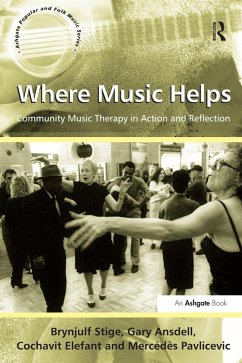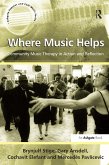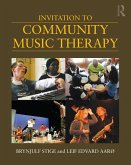This book explores how people may use music in ways that are helpful for them, especially in relation to a sense of wellbeing, belonging and participation. The central premise for the study is that help is not a decontextualized effect that music produces. The book contributes to the current discourse on music, culture and society and it is developed in dialogue with related areas of study, such as music sociology, ethnomusicology, community psychology and health promotion. Where Music Helps describes the emerging movement that has been labelled Community Music Therapy, and it presents ethnographically informed case studies of eight music projects (localized in England, Israel, Norway, and South Africa). The various chapters of the book portray "music's help" in action within a broad range of contexts; with individuals, groups and communities - all of whom have been challenged by illness or disability, social and cultural disadvantage or injustice. Music and musicing has helped these people find their voice (literally and metaphorically); to be welcomed and to welcome, to be accepted and to accept, to be together in different and better ways, to project alternative messages about themselves or their community and to connect with others beyond their immediate environment. The overriding theme that is explored is how music comes to afford things in concert with its environments, which may suggest a way of accounting for the role of music in music therapy without reducing music to a secondary role in relation to the "therapeutic," that is, being "just" a symbol of psychological states, a stimulus, or a text reflecting socio-cultural content.
Dieser Download kann aus rechtlichen Gründen nur mit Rechnungsadresse in A, B, BG, CY, CZ, D, DK, EW, E, FIN, F, GR, HR, H, IRL, I, LT, L, LR, M, NL, PL, P, R, S, SLO, SK ausgeliefert werden.









